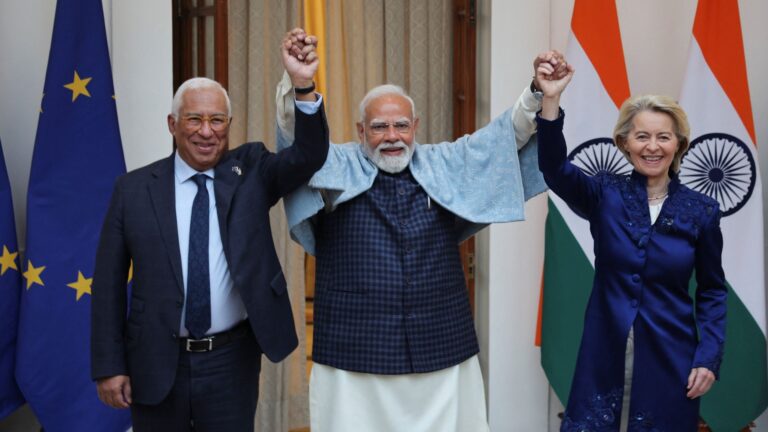
India, and the United Kingdom officially signed a comprehensive Free Trade Agreement (FTA) on July 24, 2025. This landmark development signals a robust future for their economic partnership. Prime Minister Narendra Modi, and UK Prime Minister Keir Starmer witnessed the agreement. It marks a significant milestone in efforts to deepen trade ties, and foster greater economic cooperation between the two nations.

A Legacy of Connection: A Brief History of India-UK Relations
India, and the UK share centuries of history, from the colonial era to a modern partnership. Their relationship built on democratic values, and mutual interests. The Indian diaspora in the UK, has also played a crucial role in strengthening these bonds, serving as a cultural, and economic bridge between the two countries.
In recent years, the focus shifted towards economic collaboration. The India-UK Roadmap 2030, launched in May 2021, set an ambitious framework. It guided bilateral relations, with trade, and economic partnership as a key pillar. Prior to this FTA, bilateral trade between India, and the UK stood at approximately $21.34 billion in 2023-24. This shows their growing economic engagement.
The Landmark FTA: Key Provisions, and Benefits
The newly signed FTA, formally known as the Comprehensive Economic and Trade Agreement (CETA) will significantly amplify this economic partnership. The agreement, negotiated over several years, aims to double current bilateral trade to $120 billion by 2030, as reported by the Press Information Bureau (PIB).
For India, the Agreement offers substantial advantages:
- Duty-Free Access for Indian Goods: A crucial provision ensures that approximately 99% of Indian exports will receive duty-free access to British markets. This covers nearly 100% of the trade value. This move eliminates previous tariff disadvantages India faced
- Boost for Agriculture, and Food Processing: The agreement significantly benefits India’s agricultural sector. Over 95% of India’s agricultural, and processed food products will gain duty-free access to the UK. This is projected to increase agricultural exports by over 20% in the next three years.
- Enhanced Mobility for Professionals: The FTA facilitates movement for Indian professionals. This includes independent professionals like yoga instructors, musicians, and chefs, along with business visitors, and intra-corporate transferees. Simplified visa procedures, and liberalized entry categories will make it easier for Indian talent to work in the UK.
The United Kingdom also gains considerably from the Agreement:
- Reduced Tariffs on British Goods: The FTA will substantially reduce import duties on various British products entering the Indian market. For example, import duties on UK-produced whisky, and gin will halve from 150% to 75% initially. They will further reduce to 40% within a decade. Tariffs on automobiles will also see a significant reduction from over 100% to 10%, subject to quota restrictions. This makes British goods like cars, cosmetics, aerospace components, and medical equipment more affordable for Indian consumers.
- Increased Export Opportunities: The agreement creates new export prospects for British businesses across various sectors. This will lead to increased trade volume, and economic growth.
- Job Creation: Both Prime Ministers, Keir Starmer, and Narendra Modi, emphasized that the agreement will create thousands of new jobs in their respective countries. It will boost wages, and raise living standards.
FTA Challenges, and Concerns
While the agreement covers most sectors a few sensitive areas such as dairy, edible oils, and apples were excluded to protect Indian farmers. British carmakers have voiced disappointment over complex quotas, and slow tariff reduction schedules, especially for petrol, and diesel vehicles. Non tariff barriers, and the risk of underutilization remain issues to be addressed during implementation.
Implementation, and Strategic Significance of FTA
The FTA, though signed, requires ratification by the British Parliament. This process is anticipated to take approximately one year. Once implemented, the agreement should stimulate innovation, ease market access, and foster increased investment flows between the two vibrant economies. Industry leaders in both India, and the UK welcomed the FTA’s signing. They hail it as a “transformational milestone” for bilateral economic relations.
While challenges remain, the window opens for a new era of enhanced cooperation, innovation, and prosperity across a diverse range of sectors.
For more such informative articles, stay tuned at The World Times.



